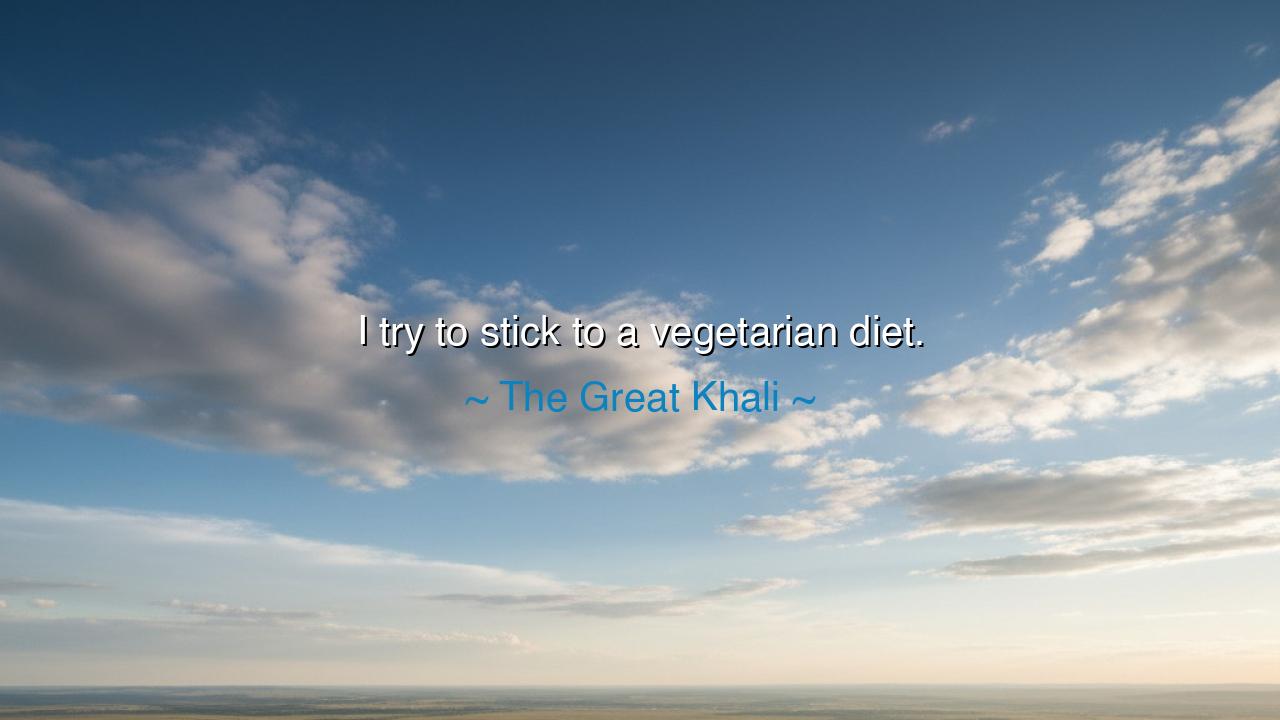
I try to stick to a vegetarian diet.






In the humble yet powerful words of The Great Khali, a man known for his towering strength and legendary stature, there emerges a wisdom that transcends flesh and bone: “I try to stick to a vegetarian diet.” To some, these words may appear simple — a statement of personal choice. But beneath their calm lies an ancient echo, a truth that has flowed through centuries of saints, warriors, and sages — that strength need not come from the taking of life, but from harmony with it. For to choose a vegetarian way of living is not merely a matter of food, but a declaration of respect — for the earth, for one’s body, and for the quiet pulse of life that beats within all things.
Born in the mountains of Himachal Pradesh, Khali rose from humble beginnings to become one of the giants of the wrestling world — a figure both feared and admired. Yet even amidst the roar of crowds and the hunger for power, he did not abandon gentleness. His diet, he says, is one of plants and grains, of nourishment drawn not from blood, but from the abundance of the soil. This choice is a testament to a deeper philosophy — that true might is not the devouring of life, but the mastery of the self. As the ancients knew, the greatest battle is not against others, but against one’s own appetites.
In his words, we hear the distant voice of Ahimsa, the eternal principle of non-violence preached by sages like Mahatma Gandhi and Lord Buddha. These great souls taught that food is not only fuel for the body, but also a mirror of the soul. When one eats in awareness, one participates in the rhythm of the universe — honoring the life that sustains all things. To embrace a vegetarian diet, therefore, is to make peace with the living world, to live in tune with compassion rather than conquest. Khali, though a warrior of modern sport, walks this path of balance — proving that compassion and strength can dwell together in the same heart.
History, too, offers its examples. The mighty Roman gladiator Maximus Decimus of legend — whose name means “the greatest” — was said to eat a diet largely of grains and beans, and his strength in battle was feared across the arenas. Centuries later, the philosopher Pythagoras, renowned for his wisdom and intellect, lived by the same creed. He refused to consume animals, believing that to eat the flesh of another being was to cloud the mind and burden the soul. Through him, the term “Pythagorean diet” became synonymous with what we now call vegetarianism. Thus, The Great Khali stands in the company of those ancient seekers who knew that purity of diet nurtures purity of thought.
But there is another layer to Khali’s declaration — one not of holiness, but of discipline. To “stick to” any path requires perseverance. The modern world is full of temptation — the easy meal, the quick indulgence, the neglect of what the body truly needs. To remain steadfast in a vegetarian lifestyle is to practice mindfulness, to remember with every meal that one’s strength is built by choice, not chance. This is the spirit of the warrior — not one who conquers others, but one who conquers the chaos within.
And yet, Khali’s words are not a command, but an invitation — a reminder that each person must find the way that brings them balance. His tone is neither boastful nor dogmatic. “I try,” he says — and in that humility lies the essence of wisdom. For even the strongest must strive; even the mighty must learn moderation. The goal is not perfection, but awareness — to eat with gratitude, to live with respect for the life that sustains one’s own.
So, let this be the lesson passed down: Strength is not born from cruelty, but from conscious living. The body thrives when it is fed with clean food, the spirit when it is nourished by compassion. Whether one chooses the vegetarian path or another, let every meal be taken as an act of reverence — for food is not mere sustenance, but a covenant between the human and the divine. To eat mindfully is to honor that covenant; to live gently is to become part of the eternal harmony that binds all life.
Thus, The Great Khali, the warrior of towering frame, teaches a truth once whispered by the saints: that true greatness does not shout, but listens — listens to the heart, the earth, and the quiet wisdom of the body. And in that listening, one finds the secret of all health, all peace, and all enduring strength — not the strength to dominate, but the strength to live in harmony with the world that gave us life.






AAdministratorAdministrator
Welcome, honored guests. Please leave a comment, we will respond soon